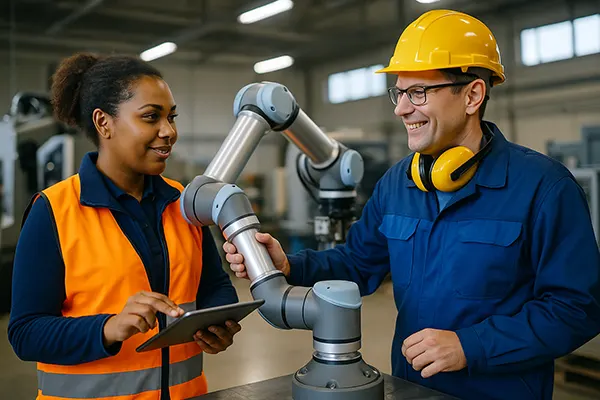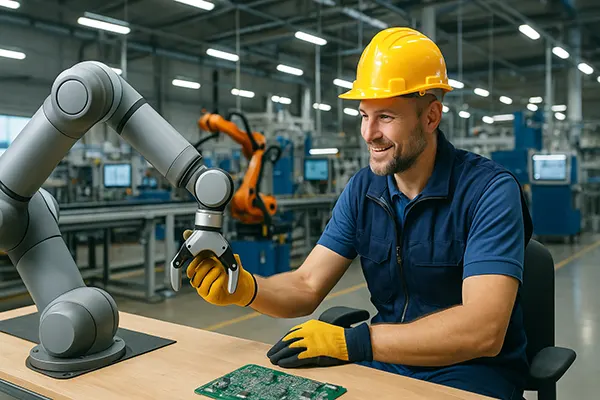Industry 5.0 is the emerging phase of industrial development that redefines production by integrating human creativity, emotional intelligence, and social responsibility into advanced manufacturing systems. Unlike the previous stage, which emphasised automation and efficiency, this new approach seeks to place people back at the centre of the production process while leveraging the power of smart technologies.
The Human-Centric Shift in Production
Industry 5.0 promotes collaboration between humans and machines rather than replacing the workforce with automation. Intelligent robots and AI systems will support workers in performing repetitive tasks, allowing humans to focus on creative, strategic, and emotionally driven decision-making. This balance fosters innovation while preserving human value within production chains.
Another key aspect is the emphasis on personalisation. Manufacturers will increasingly create products tailored to individual preferences, supported by data analytics and human insight. This human touch enhances user satisfaction and strengthens brand loyalty in an era of mass customisation.
Moreover, this transformation acknowledges the psychological and emotional well-being of workers. Companies adopting Industry 5.0 will prioritise supportive environments, work-life balance, and inclusive practices, recognising that a motivated and emotionally healthy workforce is vital to long-term success.
Technologies Empowering Human Potential
Collaborative robots (cobots) are at the forefront of enabling this transition. Unlike traditional industrial robots, cobots work safely alongside people, adapting to their pace and supporting them with physical tasks. This cooperation enhances productivity while reducing strain and injury risks.
Artificial intelligence also plays a major role in relieving workers from routine analysis. AI systems can process vast amounts of data quickly, providing insights that employees can use to make creative and socially informed decisions. Rather than eliminating jobs, AI augments human capabilities.
Additionally, immersive technologies such as augmented and virtual reality will improve training, design, and remote collaboration. By combining technological precision with human perception, these tools will make manufacturing more interactive and emotionally engaging.
Sustainability and Social Responsibility
Industry 5.0 places strong emphasis on sustainable practices. Businesses will adopt circular economy principles, focusing on recycling, upcycling, and reducing resource consumption. This shift addresses global environmental concerns and aligns with climate neutrality goals set by the European Union for 2050.
Moreover, supply chains will be reshaped to ensure transparency and ethical sourcing. Consumers are increasingly demanding products made under fair labour conditions, and Industry 5.0 responds by integrating social audits and ethical certifications into production processes.
Social value creation becomes a core performance indicator. Companies will be evaluated not only on financial profit but also on their contribution to communities, employee well-being, and broader social development, reinforcing trust between industry and society.
Green Innovations Driving Change
Advanced renewable energy systems will power factories, reducing dependency on fossil fuels and cutting operational emissions. Solar, wind, and bioenergy solutions will become standard across production networks, supported by smart energy grids.
Material innovation also contributes to sustainability goals. Biodegradable materials, lightweight composites, and smart textiles will lower environmental impact and open new market opportunities for eco-conscious products.
Waste minimisation will be achieved through closed-loop manufacturing systems, where end-of-life products are disassembled and reintroduced into the production cycle, ensuring maximum resource efficiency and minimal landfill waste.

The Future Workforce and Skills Development
The rise of Industry 5.0 demands a highly skilled workforce that combines technical expertise with emotional and social intelligence. Education systems and companies must adapt to prepare employees for roles that require creativity, empathy, and ethical reasoning alongside technical skills.
Continuous learning will become a norm, with businesses offering upskilling and reskilling opportunities to help workers stay relevant in rapidly evolving industries. Lifelong education will be essential to maintain competitiveness and innovation.
Furthermore, organisational culture will shift towards collaborative, purpose-driven models. Employees will be encouraged to contribute ideas, participate in decision-making, and align their work with ethical and social values, fostering a sense of ownership and community.
Building an Inclusive Industrial Culture
Diversity and inclusion will be treated as fundamental strengths. Companies embracing diverse perspectives will drive more innovative solutions and better reflect the societies they serve, improving trust and market adaptability.
Emotional intelligence will be prioritised in leadership roles. Managers will be trained to support mental health, resolve conflicts empathetically, and motivate teams through positive engagement rather than strict hierarchy.
Lastly, human-centric workplaces will integrate social benefits such as flexible working conditions, mental health programmes, and community initiatives. These measures will strengthen employee loyalty and position companies as socially responsible leaders in the new industrial era.

